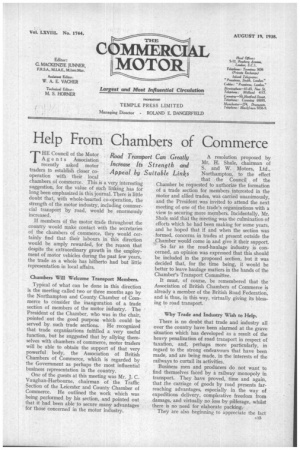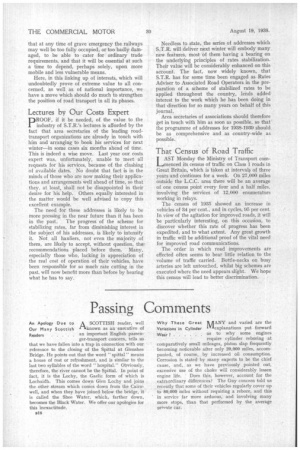Help From Chambers of Commerce
Page 25

Page 26

If you've noticed an error in this article please click here to report it so we can fix it.
THE Council of the Motor Agents Association recently asked motor traders to establish closer cooperation with their local chambers of commerce. This is a very interesting suggestion, for the value of such linking has for long been emphasized in this journal. There is little doubt that, with whole-hearted co-operation, the strength of the motor industry, including commercial transport by road, would be enormously increased.
If members of the motor trade throughout the country would make contact with the secretaries of the chambers of commerce, they would certainly find that their labours in this direction would be amply rewarded, for the reason that despite the extraordinary growth in the employment of motor vehicles during the past few years, the trade as a whole has hitherto had but little representation in local affairs.
Chambers Will Welcome Transport Members.
Typical of what can be done in this direction is the meeting called two or three months ago by the Northampton and County Chamber of Commerce to consider the inauguration of a trade section of members of the motor industry. The President of the Chamber, who was in the chair, pointed out the good purpose which could be served by such trade sections. He recognized that trade organizations fulfilled a very useful function, but he suggested that by allying themselves with chambers of commerce, motor traders will be able to obtain the support of that very powerful body, the Association of British Chambers of Commerce, which is regarded by the Government as perhaps the most influential business representation in the country.
One of the guests at this meeting was Mr. J. C. Vaughan-Harboume, chairman of the Traffic Section of the Leicester and County Chamber of Commerce. He outlined the work which was being performed by his section, and pointed out that it had been able.to secure many advantages for those concerned in the motor industry. A resolution proposed by Mr. H. Shale, chairman of S. and W. Motors, Ltd., Northampton, to the effect that the Council of the Chamber be requested to authorize the formation of a trade section for members interested in the motor and allied trades, was carried unanimously, and the President was invited to attend the next meeting of one of the trade's organizations with a view to securing more members. Incidentally, Mr. Shale said that the meeting was the culmination of efforts which he had been making for some years, and he hoped that if and when the section was formed, concerns in trades at present outside the Fhamber would come in and give it their support. • So far as the road-haulage industry is concerned, an opinion was expressed that this should be included in the proposed section, but it was decided that, for the time being, it would be better to leave haulage matters in the hands of the Chamber's Transport Committee.• It must, of course, be remembered that the Association of British Chambers of Commerce is already a member of the British Road Federation, and is thus, in this way, virtually giving its blessing to road transport.
Why Trade and Industry Wish to Help.
There is no doubt that trade and industry all over the country have been alarmed at the grave situation which has developed as a result of the heavy penalization of road transport in respect of taxation, and, perhaps more particularly, in regard to the strong endeavours that have been made, and are being made, in the interests of the railways to curtail its activities.
Business men and producers do not want to find themselves faced by a railway monopoly in transport. They have proved, time and again, that the carriage of goods by road presents farreaching advantages, especially in the way of expeditious delivery, comparative freedom from damage, and virtually no loss by pilferage, whilst there is no need for elaborate packing.
They are also beginning to appreciate the fact that at any time of grave emergency the railways may well be too fully occupied, or too badly damaged, to be able to cater for ordinary trade requirements, and that it will be essential at such a time to depend, perhaps solely, upon more mobile and less vulnerable means.
Here, in this linking up of interests, which will undoubtedly prove of extreme value to all concerned, as well as of national importance, we have a move which should do much to strengthen the position of road transport in all its phases.
Lectures by Our Costs Expert
pROOF, if it be needed, of the value to the industry of S.T.R.'s lectures is afforded by the fact that area secretaries of the leading roadtransport organizations are already in touch with him and arranging to book his services for next winter—in some cases six months ahead of time. This is indeed a wise move. Last year our costs expert was, unfortunately, unable to meet all requests for his services, because of the clashing of available dates. No doubt that fact is in the minds of those who are now making their applications and arrangements well ahead of time, so that they, at least, shall not be disappointed in their desire for his help. Others equally interested in the matter would be well advised to copy this excellent example.
The need for these addresses is likely to be more pressing in the near future than it has been in the past. The progress of the scheme for stabilizing rates, far from diminishing interest in the subject of his addresses, is likely to intensify it. Not all hauliers, not even the majority of them, are likely to accept, without question, the. recommendations placed before them. Many, especially those who, lacking in appreciation of the real cost of operation of their vehicles, have been responsible for so much rate cutting in the past, will now benefit more than before by hearing what he has to say. Needless to state, the series of addresses which S.T.R. will deliver next winter will embody many new features, most of them having a bearing on the underlying principles of rates stabilization. Their value will be considerably enhanced on this account. The fact, now widely known, that S.T.R. has for some time been engaged as Rates Adviser to Associated Road Operators in the preparation of a scheme of stabilized rates to be applied throughout the country, lends added interest to the work which he has been doing in that direction for so many years on behalf of this journal.
Area secretaries of associations should therefore get in touch with him as soon as possible, so that the programme of addresses for 1938-1939 should be as comprehensive and as country-wide as possible.
That Census of Road Traffic
LAST Monday the Ministry of Transport commenced its census of traffic on Class 1 roads in Great Britain, which is taken at intervals of three years and continues for a week. On 27,000 miles outside the L.C.C. area there will be an average of one census point every four and a half miles, involving the services of 12,000 enumerators working in relays.
The census of 1935 showed an increase in vehicles of 34 per cent., and in cycles, 95 per cent. In view of the agitation for improved roads, it will be particularly interesting, on this occasion, to discover whether this rate of progress has been expedited, and to what extent. Any great growth in traffic will be additional proof of the vital need for improved road communications.
The order in which road improvements are effected often seems to bear little relation to the volume of traffic carried. Bottle-necks on busy arteries are left untouched, whilst big schemes are executed where the need appears slight. We hope this census will lead to better discrimination.




















































































